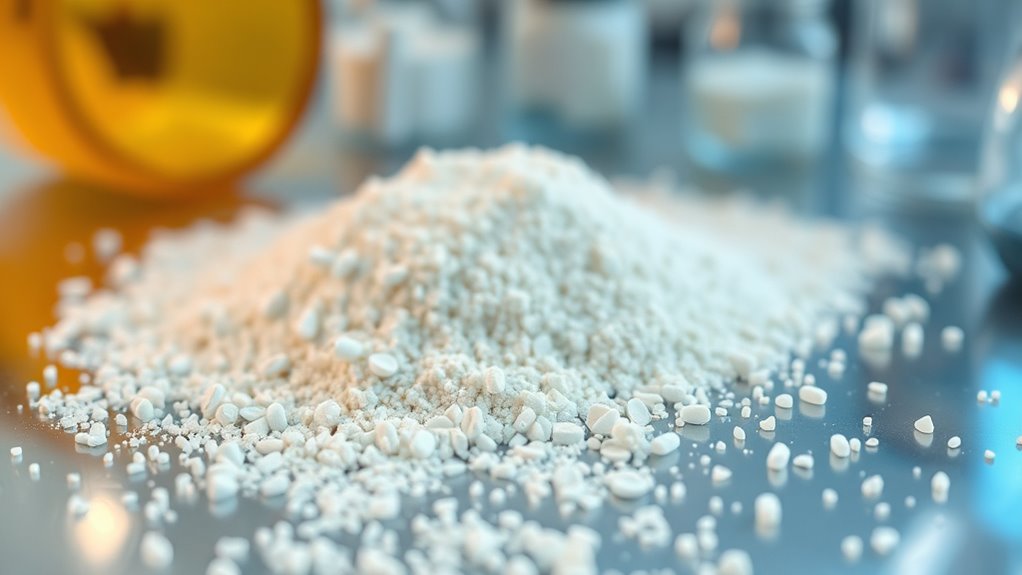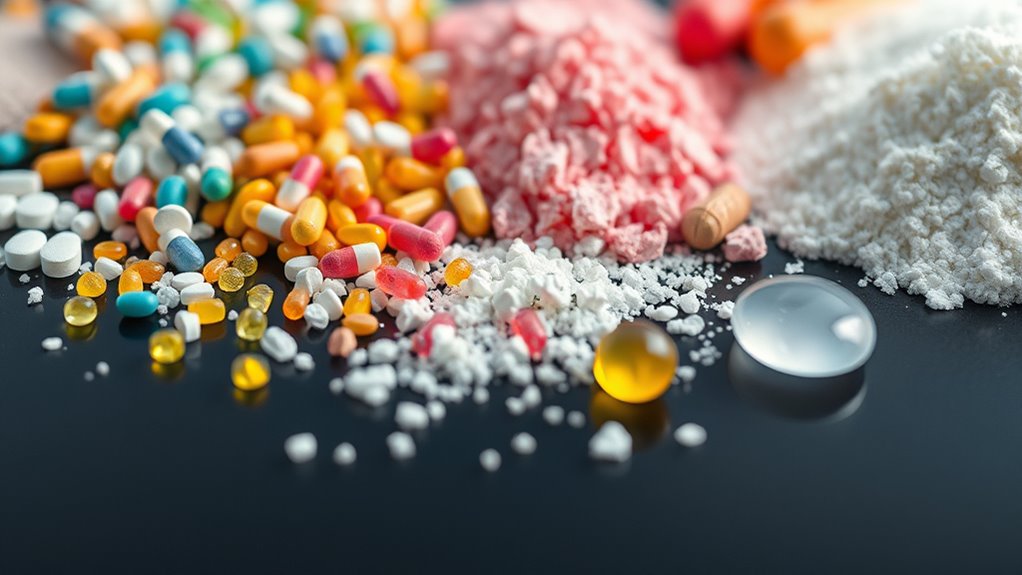Excipients are crucial in drug formulation because they protect the active ingredient from environmental factors, ensuring the medication stays effective longer. They also control how the drug is released in your body, improving its effectiveness and reducing side effects. Plus, they make medicines more palatable and easier to take, boosting your compliance. Understanding how excipients work helps you see their importance in creating safe, reliable medications—there’s much more to uncover if you keep exploring.
Key Takeaways
- Excipients protect APIs from environmental factors, ensuring drug stability and prolonging shelf life.
- They enhance patient compliance by improving taste, texture, and ease of administration.
- Excipients control the drug release profile for targeted and effective therapy.
- Proper selection and compatibility of excipients optimize drug performance and safety.
- They are essential for creating effective, stable, and user-friendly medications.

Excipients play a essential role in drug formulation by ensuring that active pharmaceutical ingredients (APIs) are delivered effectively and safely. These substances, although not active themselves, are indispensable for the drug’s performance, safety, and user experience. When it comes to enhancing drug stability, excipients act as protectors, shielding APIs from environmental factors like moisture, oxygen, and light that can cause degradation. For instance, certain excipients help maintain the chemical integrity of sensitive APIs, prolonging shelf life and ensuring the medication remains effective until its expiration date. By stabilizing the drug, excipients reduce the risk of potency loss, minimizing the need for reformulation or additional preservatives. This stability is especially essential for drugs sensitive to temperature, humidity, or pH changes, as excipients can buffer or insulate the API against these variables, ensuring consistent therapeutic outcomes.
Beyond stability, excipients play a significant role in improving patient compliance. You might not realize it, but the choice of excipients influences the taste, texture, and ease of use of a medication. For example, smooth, easily swallowed tablets or capsules with palatable coatings are more likely to be taken regularly. Excipients like flavoring agents, sweeteners, and disintegrants make medications more appealing, especially for children or elderly patients who may find unpalatable drugs difficult to swallow or unpleasant to taste. These improvements in formulation help reduce missed doses and enhance overall adherence to prescribed regimens. Additionally, excipients contribute to the optimized release profile of the drug, ensuring the API is released at the right rate and location in the gastrointestinal tract, which can improve therapeutic effectiveness and minimize side effects. When patients experience fewer adverse effects and find medications easier to take, they’re more likely to stick with their treatment plan.
Manufacturers carefully select excipients to align with the drug’s intended use and patient needs. They consider factors like compatibility with the API, safety profiles, and manufacturing processes. The right excipient combination can make a significant difference in how well a drug performs and how patients perceive it. Ultimately, excipients are more than just fillers; they’re strategic components that enhance drug stability, improve patient compliance, and contribute to the overall success of a medication. Their thoughtful integration ensures that medications are not only effective but also user-friendly, supporting better health outcomes for those who rely on them.
Frequently Asked Questions
How Do Excipients Affect Drug Stability?
Excipients affect drug stability by interacting with active ingredients, which can lead to excipient interactions that compromise efficacy. They also undergo degradation over time, affecting the formulation’s integrity and shelf life. By carefully selecting excipients, you can minimize degradation and unwanted interactions, ensuring the drug remains stable and effective throughout its intended shelf life. Proper formulation helps prevent stability issues caused by excipient-related reactions.
Are There Natural Excipients Used in Formulations?
You can definitely find natural excipients in formulations, sourced directly from nature’s vast treasury. Plant-derived excipients, like starches, cellulose, and gums, are common because they come from natural sources and are highly compatible with the human body. These natural excipients often enhance drug delivery, improve stability, and reduce side effects, making them a sophisticated choice for modern formulations. Their use showcases a harmony between science and nature, elevating pharmaceutical development.
Can Excipients Cause Allergic Reactions?
Excipients can cause allergic reactions if you’re sensitive to them, as they may trigger immune responses through allergic reaction mechanisms. You might experience symptoms like rash, swelling, or difficulty breathing. It’s important to check excipient ingredients in medications, especially if you have known allergies. Always inform your healthcare provider about any allergies, so they can choose formulations with excipients less likely to provoke allergic reactions.
How Are Excipients Selected for a New Drug?
When selecting excipients for a new drug, you consider excipient compatibility with the active ingredient to prevent reactions or stability issues. You also evaluate excipient manufacturing processes to guarantee quality, consistency, and safety. Factors like solubility, stability, and patient tolerability guide your choices. By thoroughly reviewing these aspects, you ensure the excipients will support effective drug delivery while maintaining compliance with regulatory standards.
What Regulations Govern Excipient Safety?
They say “better safe than sorry,” and that’s why regulatory standards govern excipient safety. You must conduct thorough safety assessments to guarantee excipients don’t harm patients. Agencies like the FDA and EMA set strict guidelines, requiring detailed data on toxicity, purity, and stability. These regulations protect public health, making sure that every excipient used in your drug meets the highest safety standards before it reaches consumers.
Conclusion
Excipients are the unsung heroes in drug formulation, quietly supporting the active ingredients like anchors holding a ship steady. They guarantee your medication works safely, effectively, and comfortably. Without them, the journey from pill to patient would be a turbulent voyage. So, next time you take a medication, remember that these tiny ingredients are the silent architects behind its success, making sure your health stays on course.








